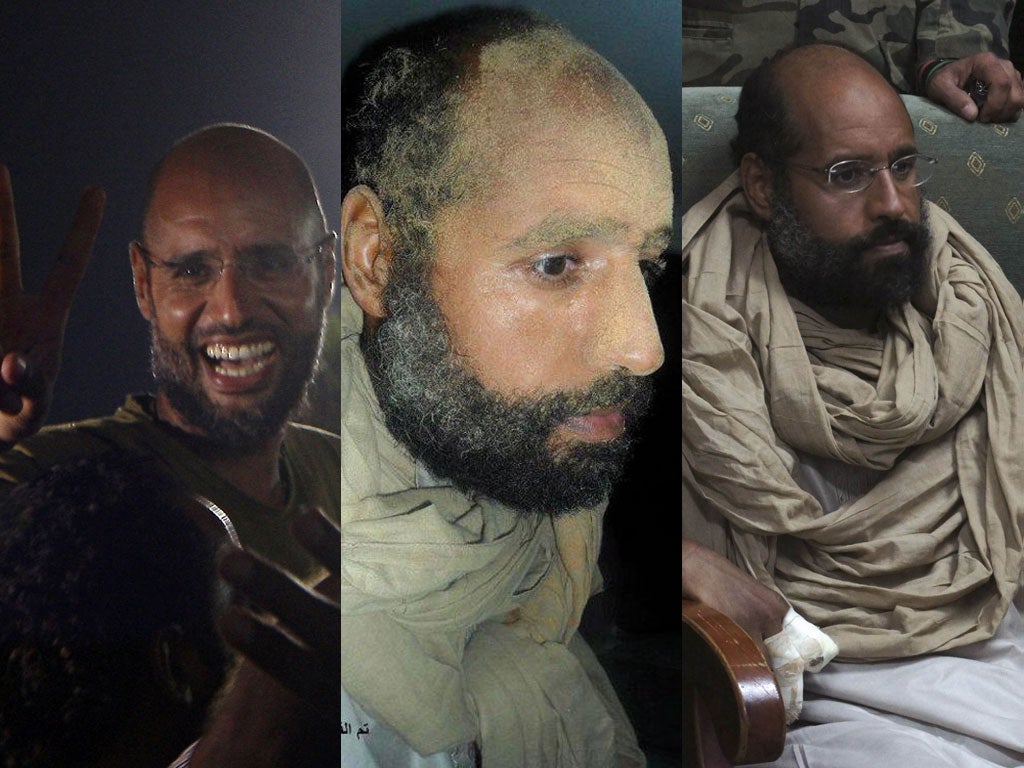Gaddafi's son Saif al-Islam fails in bid to be tried abroad
Fears grow that plan to try Saif al-Islam in Zintan could spark new round of violence

Your support helps us to tell the story
From reproductive rights to climate change to Big Tech, The Independent is on the ground when the story is developing. Whether it's investigating the financials of Elon Musk's pro-Trump PAC or producing our latest documentary, 'The A Word', which shines a light on the American women fighting for reproductive rights, we know how important it is to parse out the facts from the messaging.
At such a critical moment in US history, we need reporters on the ground. Your donation allows us to keep sending journalists to speak to both sides of the story.
The Independent is trusted by Americans across the entire political spectrum. And unlike many other quality news outlets, we choose not to lock Americans out of our reporting and analysis with paywalls. We believe quality journalism should be available to everyone, paid for by those who can afford it.
Your support makes all the difference.Prosecuters in Libya announced yesterday that the son of the late dictator Muammar Gaddafi will go on trial next month in the town of Zintan, fuelling fears that violence will escalate in the country over the coming months.
Saif al-Islam Gaddafi, 40, who has been held in Zintan, 90 miles south of Tripoli, since being captured in November last year, had asked to be tried by the International Criminal Court (ICC) in The Hague. But Libyan prosecuters have confirmed that he will face charges – outlined in April as financial corruption, murder and rape – in Libya.
According to analysts, it is likely that Saif al-Islam – who was considered to be Gaddafi's heir apparent during the popular uprising against his late father last year – will be found guilty and executed by hanging.
The defence team assigned to Saif al-Islam at the ICC have claimed it is almost impossible for him to receive a fair trial in his home country. The decision is likely to fuel violence within Libya, as staunch Gaddafi loyalists have warned they will take revenge if Saif al-Islam is harmed. These threats follow a series of car bombings, assassinations and abductions, allegedly carried out by loyalists, across the country during recent weeks, as pro-revolutionary Libyans celebrated the first anniversary of Tripoli's "liberation" by rebel forces in August last year. Colonel Gaddafi, whose dictatorship spanned 42 years, was killed in Misrata last October after being captured by rebels.
Taha Nasser Baara, the prosecutor general's spokesman, said: "A committee from the prosecutor general's office has completed its investigation into the crimes committed by Saif al-Islam from the start of the revolution [on 15 February 2011] and has prepared the charge sheet."
The charges include urging Gaddafi loyalists to kill demonstrators and revolutionaries.
The trial is expected to last up to six months and will be heard by three Libyan judges on evidence gathered by several lawyers. Some of the proceedings will be open to the public, but prosecution witnesses have not been named for fear of assassinations.
The decision follows much drama in Libya and on the international stage. The Zintan militia, which captured Saif al-Islam last November as he fled across the desert, had initially refused to hand him over to the Libyan authorities for trial in Tripoli, claiming that sympathisers there could help him to escape. Despite demands by the ICC and the international community, a compromise was reached to hold the trial in Zintan.
However, the Zintan militia also used Saif al-Islam as a political bargaining tool with the Libyan authorities, ensuring posts for their members in the country's new government.
At one stage Saif al-Islam's ICC defence team was held by the Zintan militia for more than three weeks on allegations of "spying and improper conduct", charges emphatically denied by the ICC. Only high-level intervention by the ICC and the Australian government ensured their release.
The security situation in Libya since the revolution has been tenuous, with militias still in control of large swathes of the country. The groups are accused of carrying out human rights abuses in dozens of detention centres, with many of the victims said to be Gaddafi sympathisers.
The Independent recently spoke to a number of Gaddafi sympathisers in the Tripoli suburb of Abu Salim, a loyalist stronghold which was flooded with weapons by Gaddafi before he fled the capital.
Ahmed, who fought with Gaddafi forces during the revolution, said: "We are waiting for the right time to strike back. We are all armed and we have weapons underground."
Join our commenting forum
Join thought-provoking conversations, follow other Independent readers and see their replies
Comments